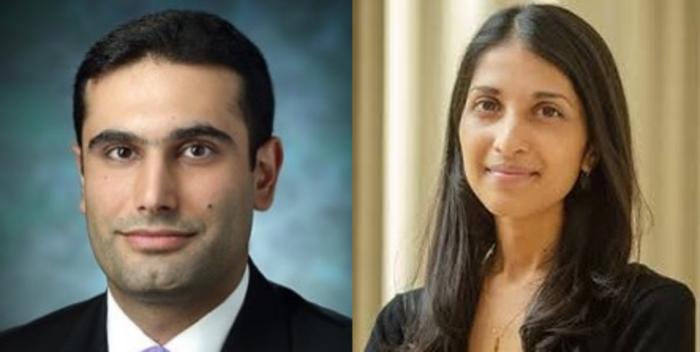(LOS ANGELES) – February 29, 2024 – The Terasaki Institute for Biomedical Innovation (TIBI) is pleased to announce their selections of Assistant Professors Amir Manbachi of Johns Hopkins University and Ritu Raman of the Massachusetts Institute of Technology (MIT) as the recipients of the 2024 Hisako Terasaki Young Innovator Awards. The awards will be presented at TIBI’s 2nd annual Terasaki Innovation Summit, to be held March 27-29, 2024, at the UCLA Meyer & Renee Luskin Conference Center.

Credit: Original content from awardees
(LOS ANGELES) – February 29, 2024 – The Terasaki Institute for Biomedical Innovation (TIBI) is pleased to announce their selections of Assistant Professors Amir Manbachi of Johns Hopkins University and Ritu Raman of the Massachusetts Institute of Technology (MIT) as the recipients of the 2024 Hisako Terasaki Young Innovator Awards. The awards will be presented at TIBI’s 2nd annual Terasaki Innovation Summit, to be held March 27-29, 2024, at the UCLA Meyer & Renee Luskin Conference Center.
The award was created in memory of Hisako Terasaki, philanthropist, accomplished artist, and wife of Dr. Paul I. Terasaki, a pioneer in organ transplant research and innovation. It recognizes early-career scientists who have made significant contributions to biomedical science by creating novel or markedly improved technologies which show great promise for high-impact translation. This year’s award recipients were stellar candidates, chosen for their extraordinary accomplishments and prolific scientific contributions during their young academic careers.
Amir Manbachi, Ph.D.
In addition to being Assistant Professor in several departments at Johns Hopkins University, Dr. Amir Manbachi is also the Co-Director of the university’s collaborative HEPIUS Innovation Lab, a design innovation hub for spinal cord injury. In establishing his laboratory, Dr. Manbachi leveraged his expertise in ultrasound technology for diagnostics and therapeutics, as well as his exemplary ability to bring together collaborators from clinical, academic, and industrial realms. Through his efforts, Dr. Manbachi was able to develop an ultrasonic toolkit for spinal surgery, which enables augmented imaging for surgical navigation, a research area which continues to evolve. This technology has also been applied to work in glioma/neurosurgery, as well as in the regulation and classification of blood vessels.
As he’s risen quickly in his career trajectory at Johns Hopkins, Dr. Manbachi has also used his talents for translational research and entrepreneurial innovation, and this has produced high-impact technology supported by top-notch funding from the NIH, National Science Foundation (NSF), and the Department of Defense (DOD). While still in the early years of his career, he received multiple such awards, including a $13.48 million DOD contract.
He has also been well received by his peers and mentees for his award-winning leadership and managerial skills, and currently leads a research team of approximately 70 individuals.
In his relatively short professional career, Dr. Manbachi has truly exhibited all the qualities needed to translate high-impact biomedical innovations into the real world, and TIBI is pleased to recognize him as a Hisako Terasaki Young Innovator Award recipient.
Ritu Raman, Ph.D.
From her years as a Ph.D. student and postdoctoral fellow to her current position as Assistant Professor of Mechanical Engineering at MIT, Dr. Ritu Raman has exhibited exceptional talent in creating novel and inventive solutions to the most challenging biomedical needs.
While still a Ph.D. student, she developed methods for tissue engineering of light-sensitive neuromuscular skeletal muscle for soft robotics, as well as protocols for 3D printing and cryopreservation used in high-throughput manufacturing of engineered muscle. These bodies of work not only produced high-impact papers and articles but garnered awards and special recognitions.
After she subsequently obtained multiple fellowships, she worked as a postdoctoral researcher and eventually developed an independent research program under Professor Robert Langer at MIT, where she addressed the most critical challenges of the university’s efforts in drug delivery and biomedical sensing. Drawing on her previous experience with light-sensitive biomaterials, Dr. Raman developed a novel light-degradable hydrogel which could activate and interface with implantable devices; this hydrogel had the doubly unique capability of degradation using non-invasive ingestible LEDs.
In another project, Dr. Raman developed a novel implantable microfluidic pump which uses a heat-sensitive alloy to modulate nanoliter fluid delivery to highly specific regions of the brain. This groundbreaking technology can also be used for extracting micro-invasive liquid biopsies in deep brain structure – an unprecedented feat.
Dr. Raman is currently working on a variety of well-funded projects to reach her goal of using tissue engineered muscle to treat diseases of human mobility. These projects spotlight unique approaches, involving light-sensitive tissue engineered muscle and different platforms for stimulating muscular motion, assembly, and growth.
In addition to her research, Dr. Raman has been a prolific author and mentor to over 44 trainees, and she has been active in promoting access to STEM education for women and underrepresented minorities.
TIBI is excited to bestow the Hisako Terasaki Young Innovator Award upon Dr. Raman for her exceptional creativity and innovation, as well as for her excellence in achievement and productivity.
“Much as my parents’ passion for their chosen fields has influenced their lives and those of others, these young scientists have greatly impacted the health and well-being of countless people,” said Keith Terasaki, M.D., TIBI’s Chairman of the Board and son of Hisako and Dr. Paul Terasaki. “It gives me great pleasure to recognize them for their outstanding accomplishments.”
###
About the Terasaki Institute for Biomedical Innovation
The Terasaki Institute for Biomedical Innovation is accelerating the pace of translational research by supporting the world’s leading scientists with an open, entrepreneurial environment for bioengineering new materials, biological models, and advanced technologies to address critical challenges to the health of the planet and its people. The Institute’s worldwide collaborations with academic, clinical, and entrepreneurial partners provide a rich foundation for translating innovations to the real world.
Contact:
Stewart Han
President
Terasaki Institute for Biomedical Innovation
[email protected]




